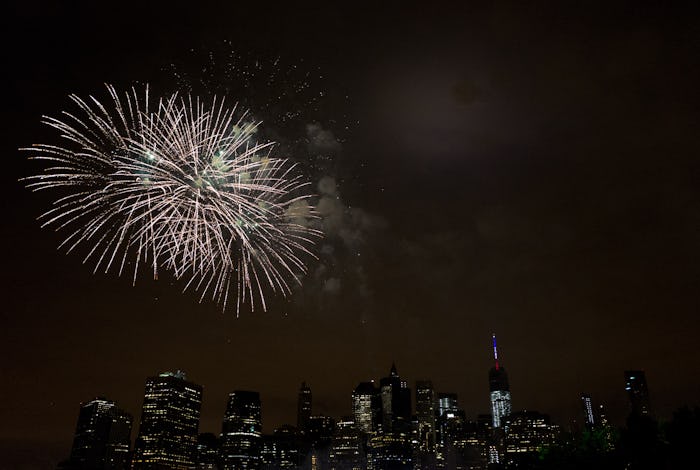
Offensive Things You Shouldn't Say On 4th Of July
The Fourth of July holiday often sparks fond memories for many people in America. Families get together, there's barbecue, and people show lots of American pride by sporting their favorite red, white, and blue outfits. Then there's the magical fireworks shooting out into the sky. Full disclosure: I was born on July 4, so it's always been a happy day for me, especially since my parents lovingly told me as a child that every firework was in honor of my birthday. Seriously, how sweet. But as Americans celebrate the country's independence, and their love for the land of the free, it's important to remember the offensive things you shouldn't say on the Fourth of July.
The Declaration of Independence was officially adopted on July 4, 1776, and therefore the day is celebrated as America's independence from Great Britain. But America, in 1776, and many years to follow, wasn't the "land of the free," that U.S. citizens inadvertently celebrate, for everyone. America still struggles with the lingering effects of slavery, systemic and institutionalized racism, sexism, and xenophobia (cue the country's presumptive Republican presidential nominee) that was fostered at the time the Declaration of Independence was adopted. So, there are a lot of things for Americans to keep in mind as they pull out their grills next week.
One thing for sure, saying all Americans were free in 1776 is certainly not accurate.
As aforementioned, it's important to internalize and appreciate that slavery still existed far beyond 1776, and President Abraham Lincoln didn't issue the Emancipation Proclamation until 1863, which didn't even officially end slavery.
In a video clip, actor Morgan Freeman read one of Frederick Douglass' speeches "The Meaning Of July Fourth For The Negro" in which he perfectly highlighted the hypocrisy in considering July 4, 1776 as "Americans'" independence:
Fellow citizens pardon me, allow me to ask why am I called upon to speak here today. What have I, or those I represent to do, with your national independence? Are the great principles of political freedom and [...] justice embodied in that Declaration of Independence extended to us?
It also continues to be important to consider Native American roots and America's cruel and atrocious history of enslavement and genocide against its country's natives. Especially since Native Americans are still grappling with a history of systemic discrimination and have disproportionate unemployment rates.
And as we celebrate America's independence, with red, white, and blue, it continues to be offensive to wear the Confederate flag, a deep-rooted symbol of hatred for Black Americans.
To be clear: these considerations don't necessarily need to be dinner table discussions at your Fourth of July party next week. And every single American, including, Native Americans, black people, and other people of color, have the right to celebrate and feel proud of America. More importantly, it's not any person of color's responsibility to ensure that these considerations are met either. But it's always good to consider America's history, and how it still impacts marginalized communities as people celebrate America's holidays. And, as a fourth of July baby, thanks in advance for the fireworks.